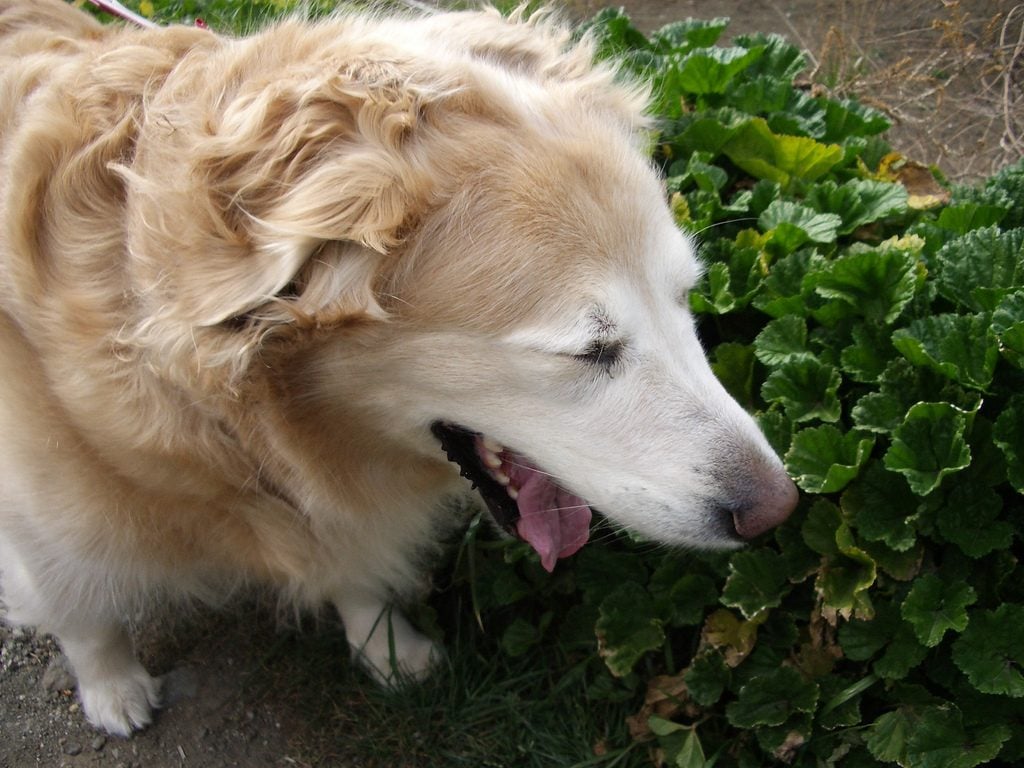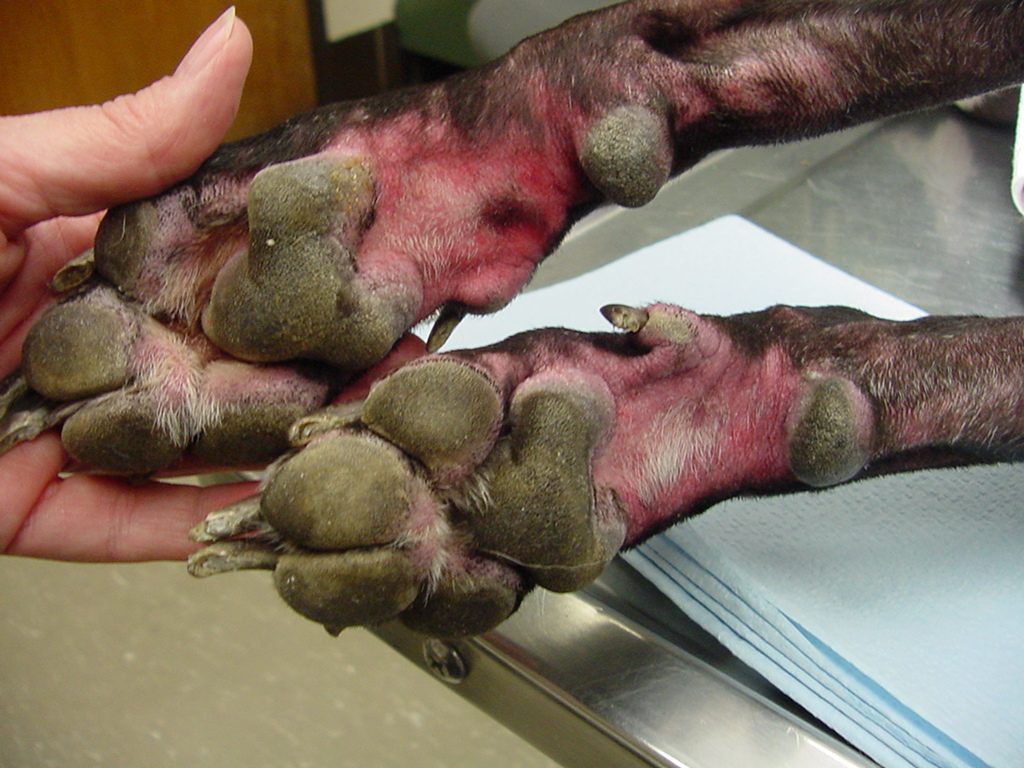- Not a substitute for professional veterinary help.
Like a lot of dogs (not to mention people), my dog has seasonal allergies that crop up a couple times a year and lead to itchiness, congestion, and general discomfort. Dog allergies are incredibly common, but they can take a bit of detective work to identify and treat.
Dogs can’t tell us what’s bothering them, so it’s up to us humans to know what symptoms to watch out for, and how to treat them.
Read on to learn about common dog allergens, and how to help your dog if she has an allergic reaction.
What is an Allergy?

Sneezing can be a sign of an environmental irritant. Photo via flickr/otamajakusi
Allergies are familiar to most of us: they’re immune responses to substances like pollen, dust, food, or fur that can cause discomfort and illness. Over time, exposure to those substances, called allergens, can sensitize the immune system and cause a harmful over-reaction.
Do dogs get allergies? You bet! Some of the most common dog allergens include:
- Tree, grass, and weed pollens
- Mold spores
- Dust and house dust mites
- Dander (yep, your dog can be allergic to fur)
- Food ingredients (corn, wheat, soy, or specific animal proteins)
- Flea saliva (flea allergy dermatitis is very common)
- Prescription drugs
- Perfumes, cleaning products, shampoo, and certain fabrics and plastic
Signs Your Dog is Having an Allergic Reaction

Red, itchy paws are a major allergy indicator. Picture via WikiCommons
Your dog can’t come out and tell you, “Hey mom, I’m allergic to that new plant in the yard,” but his behavior will clue you in. Common signs of a mild to moderate allergic reaction in dogs include:
- Excessive paw-licking
- Scratching and butt-scooting
- Hair loss, either an all-over thinning or bald spots
- Coughing, sneezing, or asthma
- Tummy trouble like vomiting and diarrhea (for food allergies)
- Swelling of the feet, face, or joints
Itchiness is by far the most common way allergies show themselves in your dog. Left unchecked, it can lead to scabbing, hot spots, recurring skin infections, and more.
If you find yourself wondering, “is my dog having an allergic reaction?,” consider how long and how severe her symptoms have been. If you notice any of the above reactions, and they don’t clear up within a week or two, it’s time to take your pet to the vet.
Severe Allergic Reactions
While less common than the allergies listed above, some dogs can have severe reactions to things like insect stings, drugs, and certain foods. According to PetMD, sudden, extreme allergic reaction, or anaphylaxis, can include:
- Swollen muzzle and/or eyes
- Sudden gasping and trouble breathing
- Rapid-onset diarrhea or vomiting
If your dog exhibits any of these symptoms, don’t hesitate to get to the emergency vet right away. Anaphylaxis can be fatal.
How to Treat Dog Allergies
The first, most basic form of allergy treatment is prevention. You want to remove the allergens from the environment as much as possible.
1. Wipe off your dog’s paws after walks
off your dog’s paws after walks
- There are even specific pet allergen-blocker wipes
. Bonus: they use natural ingredients.
2. Use a hypoallergenic shampoo
- You can buy this and related anti-itch shampoo
over-the-counter; look for soothing ingredients like aloe or evening primrose oil. The latter is the main ingredient in this highly-rated choice
.
3. Try supplements such as biotin or omega-3s
or omega-3s
- These help to suppress itching and improve coat health.
4. Switch to a limited-ingredient diet
- Address food allergies by adjusting your pet’s diet in consultation with your vet.
If your dog’s allergies are more severe, the vet may recommend further intervention to treat symptoms. Common therapies include:
- Anti-inflammatory therapy. Treatment with drugs like antihistamines or corticosteroids can block the allergic reaction, so symptoms don’t get out of hand. These drugs are commonly prescribed for dogs with seasonal, environmental allergies to allergens that are near-impossible to avoid.
- Shampoo therapy. In addition to over-the-counter options, your vet may prescribe a medicated shampoo to treat secondary sores and infections.
- Hyposensitization therapy, or allergy shots. If your dog goes through allergy testing, a series of shots can be given to help desensitize their immune system.
Medical treatment won’t “cure” dogs of an allergy, but it will help prevent and manage symptoms, making their lives far more comfortable.
How Allergies are Diagnosed
Allergies aren’t curable, but they are usually manageable with a combination of limiting exposure to allergens, medication, veterinary therapies, and/or specialized diets.

A sedated dog undergoes skin testing for allergies, via Animal Allergy and Dermatolagy Clinic Online
The first step to identifying and treating your dog’s allergies is to visit the veterinarian. Your vet will start with a complete health history and physical exam, and may ask a lot of questions about your dog’s diet and environmental factors. It’s possible your vet will determine the cause of your dog’s allergies at that first visit, and prescribe a simple treatment plan.
Your vet may also refer you to a veterinary dermatologist for more extensive testing. If you’ve ever had allergy tests yourself, this should all be very familiar, as the process for dogs is a lot like the one for humans! The dermatologist will conduct an intra-dermal allergy test (similar to the human “scratch test”) or blood tests to identify allergens.
Allergy testing isn’t fun, but determining the specific environmental allergens impacting your dog will lead to more effective treatment. Check out Rover’s interview with a veterinary dermatologist for more specific info on the testing process.
Symptoms of allergic reactions tend to worsen as dogs age, and unfortunately, there’s no outright cure for allergies. However, by identifying the allergy, you can treat the symptoms and help your dog be more comfortable.
The information provided in this article is not a substitute for professional veterinary help.
Top image via flickr/krissen



